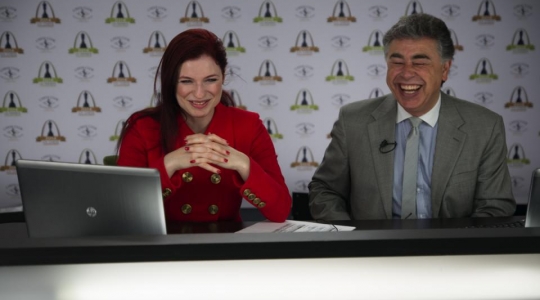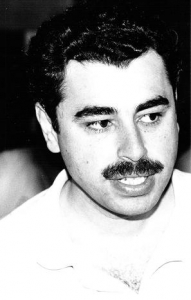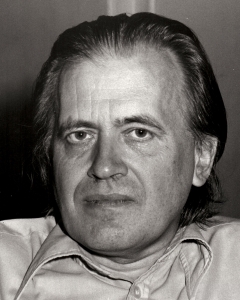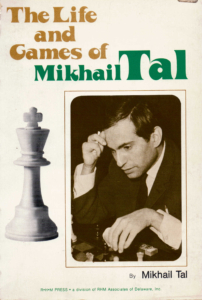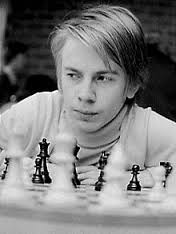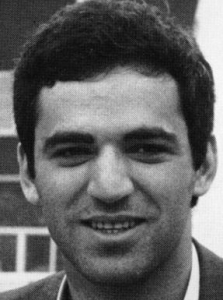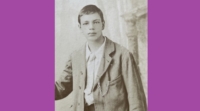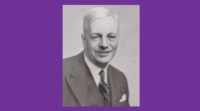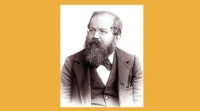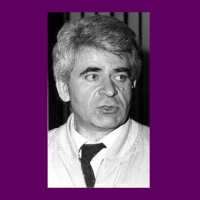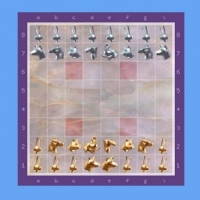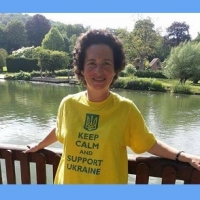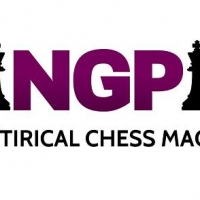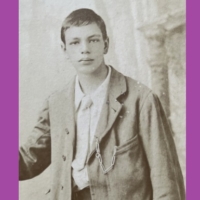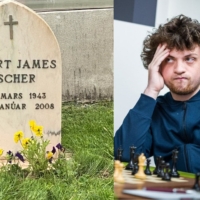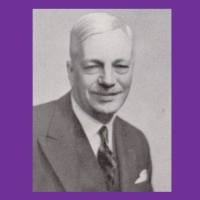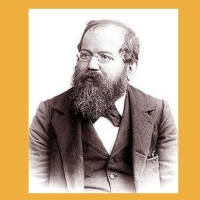Yasser Seirawan became World Junior Champion in 1979 and was twice a candidate for the World Championship title. He is currently commentating on the US Chess Championship, an event he has won four times. Kingpin interviewed him in 1998.
What is your earliest memory of playing chess?
In the summer on 1972 my family moved from beautiful Virginia Beach Virginia to Seattle, Washington. That summer set all kinds of weather records for the most rainfall in recorded history and the kids were stuck in doors. Fortunately our upstairs neighbour David Chapman introduced me to the joys of chess and spent the whole summer clobbering me. I recall being entranced by the power of my ‘towers’ and opening with 1 h2-h4 and losing. My ambition became to win just one game from David. I suspect he was about 900 Elo rated. It was the worse slump of my career.
What is your most memorable game?
Defeating Garry Kasparov in the 1986 Olympiad in Dubai. The Iran Contra scandal had just broken and Americans weren’t exactly shining princes in the United Arab Emirates. The locals embraced me as an Arabian son and followed my games voraciously. The moves of our game were being put up on a giant 4 x 4 metre chess board so an audience of several thousand could watch the game. Sure enough Garry and I got into a time scramble in the second time control and the poor board boy was moves behind. Finally, the time control was reached and the fellow could catch up. When it became obvious that I was going to win a spontaneous roar of ‘La, la, la’ went throughout the hall. (Think of the Arabs attacking the Turkish trains in Lawrence of Arabia.) The US won the match 2½-1½. The moment was sheer magic.
‘It is a lifetime regret that I didn’t cold clock him across the jaw’
What was your worst defeat?
Well there are lots to choose from! Kortchnoi in the 1987 Zagreb Interzonal. A game I was winning but lost against Speelman in the 1988 Candidates in Saint John. Losing a king and pawn endgame a pawn up to Boris Gelfand in Amsterdam 1996, were all very, very painful and quickly come to mind. But the one that hurt the most was losing to Kasparov in the 1988 Thessalonika Olympiad. His behaviour at the board was so appalling that he affected not only my concentration but that of both teams. I lost an equal ending, which only seems to have justified his antics. It is a lifetime regret that I didn’t cold clock him across the jaw. It would have been an international incident. FIDE would have barred me but my colleagues would have carried me out upon their shoulders.
Who is your all-time chess hero?
I admire many but hero worship none.
(Yasser dedicated his 2010 games collection Chess Duels to Bent Larsen, ‘My one true chess hero.’ -Ed.)
How do you relax?
Long baths, quiet walks and reading books.
What is your greatest fear?
This question has many senses. In life, I’m afraid of heights and I hate losing control on the ski slopes. In chess, I’m afraid I won’t get further opportunities to play the best players in the world. I want to have a challenging chess career.
Who is your favourite band/composer?
No single band/composer. My favourites include: Michael Jackson, Meatloaf, George Michael, Ray Charles, Stevie Wonder, Diana Ross and Whitney Houston, to name a few. I tend to like solo artists over groups.
What is your favourite record?
Rumors by Fleetwood Mac, Purple Rain by Prince, Breakfast in America by Supertramp, Thriller by Michael Jackson and Bat out of Hell by Meatloaf. Each of these albums were absolutely brilliant and at the time very moving.
What do you consider to be your greatest weakness as a chess player?
Poor opening preparation, indecision in the middlegame and bad endgame technique.
What is your greatest strength?
A powerful desire to win. A genuine joy while playing chess. An absolutely unbridled sense of optimism. When I’ve equalized I’m sure I should be winning.
What is your most unappealing habit?
Being late. To the thousands I’ve offended I’m genuinely sorry. You see, I feel like a 19th century person built for a different era when time moved much more slowly. I love long dinners and socializing at length with friends. Yet I’ve grown up in America, the land of fast food, jet travel and the five-minute shower.
Which book would you take to a desert island?
The collected works of Isaac Asimov. I wouldn’t be bored if I lived two lifetimes.
What are your five favourite chess books?
Two works by Tal, My Life and Games and the 1960 World Championship Match, David Bronstein’s Zurich Candidates, Bobby Fischer’s My 60 Memorable Games (original version), Richard Réti’s Masters of the Chessboard.
How would you characterize your chess-playing style?
Structural. I like gnawing on the base of a pawn chain, occupying weak squares, while a break away passer that scores a touchdown is poetry.
What is your favourite television programme?
Law and Order. The twists and turns in the show are brilliant.
What is your greatest extravagance?
Speculating on the stock market. I’ve made and lost millions.
Against which player do you have the worst results?
Ulf Andersson. Little Ulf packs a big punch. If he were to write a book of his best games I’d take up a good chuck of the index.
What was your most embarrassing moment at the chessboard?
Only one that I can think of: it was in Moscow at the 1990 GMA qualifier I was playing Josef Dorfman a very tense and crucial game. Josef had just grabbed his queen, ground it into the c4-square and very slowly withdrew his queen back to her original square – without releasing her. Once the queen had settled back on the original square, Josef released his queen. He eventually played a different queen move. I protested to the arbiter. The arbiter who spoke only Russian spoke to Dorfman and allowed the ‘new’ move. I protested again to the chief arbiter Geurt Geissen. Geurt listened very carefully to what I had to say and then said Dorfman’s new move stood. I protested that I wanted to see the rule book regarding touch move rules and Geurt found one. There I read nothing that could prohibit Dorfman from his original move. I put down the rule book, turned to Geurt and said, ‘I’m sorry. You are right, I am wrong.’ Geurt found my discomfiture amusing and asked where I got such an idea. I again apologized and explained that in USCF tournaments it wouldn’t be allowed to, say, play Qd1-h5 and then switch the queen to the a4-square and snap the clock. Geurt was in heaven and exclaimed, ‘Well! We certainly are not in the USCF, we are in FIDE now!’ This really rankled me and I blurted, ‘No sh#4! I thought this was a GMA tournament.’ It was the one time I lost my temper during a game and I’ve apologized to Geurt many times since.
‘Good manners are the key to life’
Which single thing would most improve the chess scene in the United States?
An extraordinary amount of energy is lost by the squabbling that takes place between organizers. If they were to work together and combine their organizational efforts chess would soar. This contagion affects the whole chess world and not just the US.
In which particular tournament do you most like to compete?
Wherever the organizers make the players feel wanted. I’ve played in small out-of-the-way tournaments where I’ve earned nothing and felt as an adopted son. These tournaments are truly the best.
Who is the most irritating opponent you have faced?
Garry Kasparov. His behaviour at the board should draw warning cards. In his defence I’ve seen him behave badly against Deep Blue where such antics have no effect. Perhaps all the energy and passion that he puts into his games bubbles to the surface and he is unaware of the effect this has on his opponents. Is he not embarrassed when he sees himself on video?
Who is the most courteous person you have played?
There are hundreds. The vast majority of my colleagues are incredible sportsmen and women! Yusupov, Beliavsky, Nunn, Short, Timman, Andersson, Nikolic, Portisch, Ribli are but a few of the shining examples. The older, mature players understand that after a lifetime of duels it is the moves that count. Amongst the younger crowd, the Polgar(s), Anand, Kramnik and Almasi are wonderful.
What is the most important lesson life has taught you?
Two critical lessons: Good manners are the key to life, and it is more important to get along than to be right.
First published in Kingpin 28 (Spring 1998)

